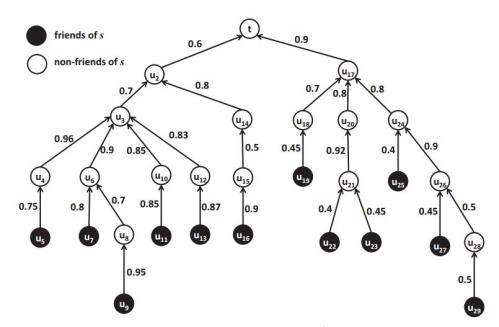March 6, 2013 report
Researchers develop algorithm to maximize friendship acceptance by strangers on social networks

(Phys.org) —A small team of computer scientists from Taiwan, the U.S. and China has developed an algorithm that aids a desire to manipulate an unknown social network user into accepting a friend request. The idea, as they describe in their paper they've uploaded to the preprint server arXiv, is to offer intelligent suggestions of other people to friend to create a mutual social circle of friends, which will increase the odds of the ultimate target agreeing to a friend request.
Social network sites work based on the concept of one person sending a friend request to another. If the request is accepted, the two become "friends" which means they gain access to each other's privately posted information. Quite often, one person wishes to become "friends" with someone else on the network that they don't know—a celebrity perhaps, or a person of influence in business. Sending a friend request to such a person generally fails, however, because the person getting the request doesn't have any reason to accept. Celebrities rarely if ever accept friend requests from people they don't know, for example, if they did, their friend list would become unmanageable, not to mention useless—the idea behind a friend list is to keep in touch with friends, after all.
But still, sometimes it would be beneficial to somehow manipulate a stranger into accepting a friend request by fooling them into believing that there are mutual acquaintances. Unfortunately, social networks don't offer a way to make that happen. In this new effort, the research team has devised a way to do it, by creating an algorithm that offers the names of people to friend to create an eventual pathway to the intended target. As more and more of these friends accept friend requests, (because they appear to be in the same social circle), it becomes more and more likely that the actual intended target will accept a friend request as it appears to them that they and the requester have many common friends, and thus exist in the same social circle.
There is one caveat here, and that is the algorithm only works if implemented by the social network itself because they are the only ones that can analyze the structure of friend relationships between different individuals who don't know each other or have any friends in common. There is also the problem of figuring out why a social network such as Facebook would ever possibly want to add such a feature. It would seem contrary to their most basic philosophy—to allow "friends" to keep in touch.
More information: Maximizing Acceptance Probability for Active Friending in On-Line Social Networks, arXiv:1302.7025 [cs.SI] arxiv.org/abs/1302.7025
Abstract
Friending recommendation has successfully contributed to the explosive growth of on-line social networks. Most friending recommendation services today aim to support passive friending, where a user passively selects friending targets from the recommended candidates. In this paper, we advocate recommendation support for active friending, where a user actively specifies a friending target. To the best of our knowledge, a recommendation designed to provide guidance for a user to systematically approach his friending target, has not been explored in existing on-line social networking services. To maximize the probability that the friending target would accept an invitation from the user, we formulate a new optimization problem, namely, emph{Acceptance Probability Maximization (APM)}, and develop a polynomial time algorithm, called emph{Selective Invitation with Tree and In-Node Aggregation (SITINA)}, to find the optimal solution. We implement an active friending service with SITINA in Facebook to validate our idea. Our user study and experimental results manifest that SITINA outperforms manual selection and the baseline approach in solution quality efficiently.
via Arxiv Blog
Journal information: arXiv
© 2013 Phys.org

















